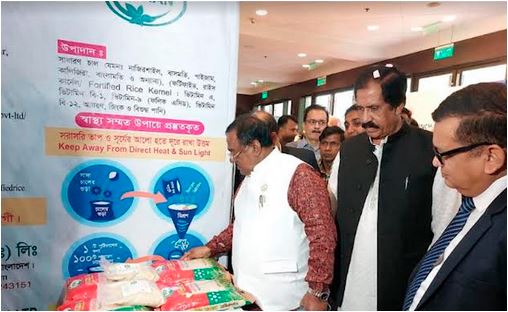
DHAKA, Nov 3, 2022 (BSS) - Food Minister Sadhan Chandra Majumder today said fortified rice will be made available through launching massive campaign to address malnutrition problem of the people.
"Fortified rice is one of the most effective means to address micronutrient deficiencies and improve nutritional status of the people in the country," he told the inaugural function of launching fortified rice as a commercially product in Bangladesh at a city hotel.
Chairman of Parliamentary Standing Committee on the Food ministry Dipankar Talukdar, MP, Secretary of Coordination and Reforms of Cabinet Division Md Atiur Rahman Atik and Resident Representative and Country Director of the World Food Programme (WEP) Dom Scalpelli, senior officials and leading nutritionists, among others addressed the function.
The minister said mill owners across the country are polishing rice, which is eventually destroying food values of rice. This kind of unhealthy practice of polishing rice must be stopped as another negative impact of polishing rice is creating shortage of good, he added.
Sadhan said, "In Bangladesh, we can address the micronutrient deficiency through fortified rice distribution in a cost effective manner."
He said with taking assistance of international partners and private sector, the government will focus on policies and interventions for reducing micronutrient deficiencies through the scaling up of rice fortification initiatives.
Scalpelli said, "Using rice as a medium presents a great opportunity to reduce micronutrient deficiencies in countries like Bangladesh where rice is a staple. It is also the most viable option in situations of limited resources, such as these times of global inflation and economic crisis."
Other speakers said despite some progress, nutrition in Bangladesh remains a serious concern with a national prevalence of stunting at 28 percent, wasting at 9.8 percent and a persistent moderate to high prevalence of micronutrient deficiencies among preschool children (6-59 months).
Therefore, micronutrient deficiencies as a form of undernutrition is a significant public health issue, they added.
Though there are ongoing efforts to promote diversified diets, without adequate resources to purchase a diverse diet, families overly rely on rice to meet their daily caloric needs, the leading nutritionists said. Rice is likely to dominate the diet of the people of Bangladesh for the foreseeable future, thus the fortification of rice with vitamins and minerals is an affordable means to significantly improve nutrition, health and economic status, they added.
The food ministry and the WFP are supporting private fortified rice producers to introduce fortified rice in rural and urban retail markets at an affordable price aiming to reach the wider population suffering from undernutrition and prevalence of micronutrient deficiencies.
WFP has also provided capacity-building and knowledge transfer activities to over 178 fortified rice blending millers and 8 private fortified rice producers and facilitated coordination between the government and the association of fortified rice blending millers.